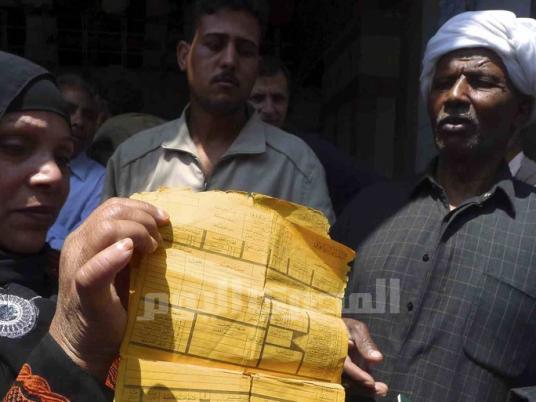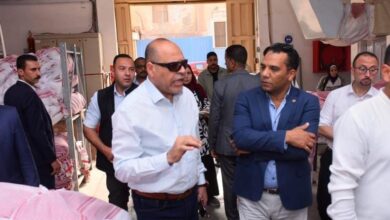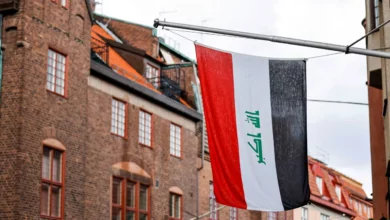
They have been there for almost a month now, a little scrum of men and women who trickle out of the building’s lobby like liquid leaking from a jar. The building, a tower block in the Cairo neighborhood of Dokki, houses the Iraqi Rafidain Bank, currently their nemesis.
In the 1980s and 90s, these men were part of a generation of Egyptian migrant workers who went to Iraq seeking the livelihood their home country could not offer.
Payment of their salaries was disrupted upon the outbreak of the Gulf War, when Egypt fought with coalition forces against Iraq. The two countries took over 20 years to reach an agreement for the payment of money owed to these Egyptians who had left behind jobs and businesses in Iraq. They were paid according to a system whereby their salaries were moved to Egypt via bank transfers, as they themselves were not allowed to transfer hard currency. They were paid in US dollars.
According to a joint committee formed by the Manpower and Immigration Ministry, Foreign Ministry and Central Bank to lay down payment guidelines for the money, there are 670,000 Egyptians entitled to a total of almost US$409 million.
Claimants must go to one of four banks responsible for cashing the transfers depending on where they worked in Iraq. Claimants go to Rafidain Bank when there is a problem with their paperwork — a misspelled name or inadequate documentation.
During the day they seek shade in the entrances to nearby shops, or atop the ventilation shaft of the Dokki metro station directly opposite the building. Grumbling commuters push their way through the mass of men; street vendors selling sweet potatoes and cold drinks cash in. A vague attempt to organize the crowd through the use of metal railings has only compounded the chaos — a physical manifestation of a bureaucratic mess.
This mess takes on a particularly cruel face the closer claimants get to the bank’s entrance, up a short flight of stairs. Three lines of policemen and plain clothes officers armed with truncheons are stationed on the stairs. Their job is crowd control, which they carry out by savagely beating back those desperate to reach the bank.
Abdel Hady Hassan from Fayoum, who has spent a week sleeping outside the bank to wait for his money, suggests that it doesn’t have to be this way.
“Of course they could do something to make things more organized. They could fix the problems in the paperwork and direct everyone to a bank to collect the money,” Hassan says.
Hassan was instructed to come to Cairo because his name is written incorrectly in his papers, but he has been unable to reach any of the bank personnel to fix the problem. He has camped outside the bank for a week but has been waiting over two decades for his money, and is keeping a careful track of time.
“Twenty-three years. To be precise, 23 years and six days of waiting,” Hassan says.
Egypt receives more remittances than any other country in the Middle East and North Africa region, and ranks sixth globally in remittance inflows. In fiscal year 2007/2008, the remittances amounted to $8.6 billion, or 4.1 percent of the Egyptian GDP, according to the Consortium for Applied Research on International Migration. In fiscal year 2006/2007, nearly 84 percent of the remittances came from the US, Kuwait, the United Arab Emirates, Saudi Arabia and Switzerland. Between fiscal years 1990/91 and 2007/2008, remittances grew from $3.8 to 8.6 billion.
Next to Hassan is Nadia Abdel Meguid Ahmed, a tiny woman dressed in black accompanying her husband, who left Iraq in 1989, on his quest to get his money from Qena. Ahmed has been given the runaround, she says, told to go from Qena to Minya and now to Cairo.
Ahmed’s husband, an elderly, slow-moving man appears and she gently pats him on his chest, asking him to produce his transfer papers. His hand makes the journey around his person, first disappearing into his sideery, a waistcoat worn underneath the galabeya, before producing the folded yellow forms slowly from a side pocket.
“They say that the money isn’t with them without even looking at the papers. Iraq is a thousand times better than Egypt!” Ahmed proclaims as she holds up the yellow form.
Aswan resident Abdel Karim Abdel Halim, who worked in Iraq for two years, says he is slated to receive payments beginning from November 1989, even though he is owed money from before this date. The 47-year-old worked in Iraq between 1988 and 1989. The father of five left his family in Upper Egypt on 9 April after a bank in Aswan told him to go to Cairo.
In 1988, Abdel Halim signed a contract according to which he would be paid $800 annually, but this was subsequently reduced to $300, so he left Iraq. In 1989, the exchange rate was LE0.89 to one US dollar. By 1991 it grew to LE3 to a dollar.
Abdel Halim is unsure why his money transfers were delayed for over 20 years but says he read in media reports that it “has something to do with the Gulf War.”
“I went to a bank in Aswan and they looked my file up in the computer and my name was correct, the transfer slip was correct, and the amount was correct. They photocopied my passport and my ID card but then said that I have to come here to Rafidain Bank. I came here on 9 April and I’m still waiting. I’m living on biscuits and tea,” Abdel Halim says, bursting into tears.
Abdel Halim is still working in construction as a day laborer when he can find work, and after two weeks of sleeping on the streets — he is reluctant to impose on acquaintances in Cairo — is becoming increasingly despondent.
“Why did I leave my children, my family, my country? To make a bit of money to start a small business that will feed my children and look after them after I’ve gone. I’ve lost hope in getting this money.”




